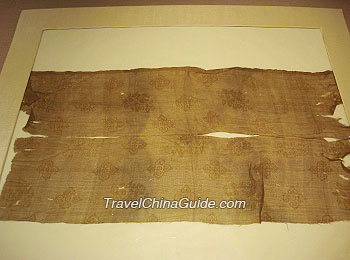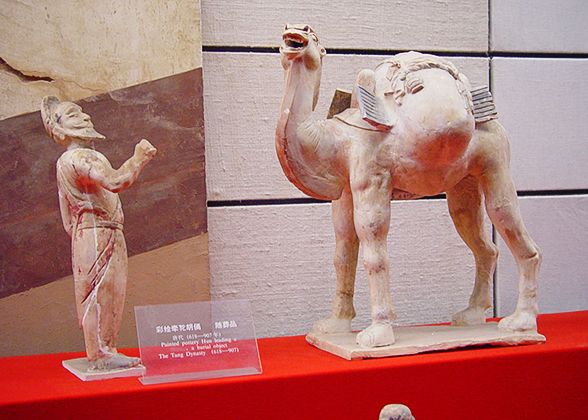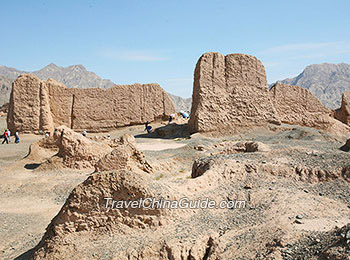After the Han Dynasty (206 BC – 220 AD) was established with the capital of Chang'an (now Xi'an) in 202 BC, the Han took the policy of intermarriage with the Huns in order to keep the peace along the northern border. In 141 BC, the ambitious Emperor Wu of Han Dynasty (Liu Che) succeeded to the throne and wanted to defeat the Huns, because the Han Dynasty had become stronger during the reigns of his predecessors, Wendi (Liu Heng) and Jingdi (Liu Qi).
Zhang Qian Opened up the Silk Road
 |
| A Piece of Ancient Silk |
In 139 BC, with the task of making a military alliance with the Da Yuezhi against the Huns,
Zhang Qian was dispatched to the Western Regions by Wudi. Unfortunately, when he reached Hexi Corridor, he was captured by the Huns and was detained as a hostage for about ten years until he finally found a chance to flee. By way of Cheshi (Turpan Basin), Yanqi (Qarashar), he headed west along the Tarim River, passed through Qiuci (Kuche) and Shule (Kashgar), crossed the Pamirs and finally reached Da Yuezhi (in Amu Darya) via Dawan (in Fergana Basin) and Kangju (Between Balkhash and Aral Sea). However, the Da Yuezhi people were satisfied with their life and refused Zhang Qian's suggestion of an alliance. After investigating Daxia (Balkh) for about one year, he decided to return to Chang'an in 128 BC. In order to avoid the area controlled by Huns, he went over Pamirs, skirted the northern foot of the Kunlun Mountains, by way of Shache (Yarkand), Yutian (Khotan) and Shanshan (Ruoqiang) and reached the residence area of Qiang Minority. He was captured by the Huns again and was detained for one year. In 126 BC, he escaped and arrived in Chang'an. Wudi was very interested in the information that Zhang Qian brought about the vast Western Regions, especially about the swift horses in Dawan.
In 119 BC, Zhang Qian set out on his second journey to the Western Regions to ally with Wusun (in Ili River). To his surprise, Wusun didn't want to fight against the Huns. At the same, Zhang Qian sent deputy envoys to other states. They left their traces in Central Asia, Southwest Asia, even the Roman Empire around the Mediterranean and North Africa. Zhang Qian was the pioneer of the Silk Road, opening up the Southern Route and Central Route.
 |
Painted Pottery of a Hun Peope
Leading a Camel on Silk Road |
Wei Qing and his nephew Huo Qubing were eminent generals who resisted the attacks of the Huns. They were skilled in tactics and famed for their bravery. As the Han cavalry became more and more powerful, Emperor Wu made up his mind to counterattack the Huns. In 129 BC, Wei Qing battled with the Huns for the first time, and won the victory. In 127 BC, the first Great War with the Huns broke out. With an army of about 40,000 cavalry, Wei Qing defeated the Huns and the fertile Hetao Area of
Yellow River was brought under the dominion of the Han Dynasty. After three years, the general made a sneak-raid against the Youxian King of Huns, sweeping to victory. In 123 BC, Huo Qubing joined the war and gained the victory by killing more than 2,000 Huns. In 121 BC, the second Great War led by Huo Qubing, the Han military fought against the Huns and fully controlled the Hexi Corridor, which cut through the Silk Road to the Western Regions. In order to wholly smash the main force of the Huns, Emperor Wu launched the third Great War in 119 BC. The army led by Wei Qing fought against the Huns until Ulan Bator in Mongolia, while the army led by Huo Qubing chased the Huns as far as Langjuxu Mountains in the present Kentei Mountains in Mongolia. The Huns suffered a severe defeat in this battle and migrated to Mobei in Mongolian Plateau. The military threat of the Hun to the Han Dynasty was abolished.
Establishment of the Protectorate of the Western Regions
 |
Subashi Relics in Kuqa.
Kuqa is an important strategic
passage along the northern Silk Road. |
Although the Han Empire won a decisive victory by beating back the Huns, it was difficult for the Han Dynasty to control the Western Regions due to the remote distance and boundless deserts. Therefore, the vast northwest region of China wasn't peaceful. The remainders of the Huns frequently invaded this region, threatening the safety of Loulan (south of the Lop Nur Lake) and Cheshi (in Turpan), so they were inclined to cooperate with the Huns and killed the Han envoys. In 108 BC, the Han emperor Wudi dispatched Zhao Ponu (a general) to attack Loulan and Cheshi, taking them under the rule of the Han Empire. In 104 BC, Li Guangli conducted an expedition to Dawan, subduing the state after a four-year war. By this time, the Western Regions were overawed by the Han Empire; many states sent envoys to Chang'an along the Silk Road to pay tribute in succession. As soon as Wudi died in 87 BC, the peace of the Western Regions was broken. In 77 BC, Fu Jiezi skillfully murdered the king of Loulan, subduing other states that were ready to make trouble.
It was not until 60 BC that the Han Dynasty established the Protectorate of the Western Regions in Wulei (near the present Luntai) to supervise the 36 states in the vast area. It protected the come-and-go of merchants and travelers along the Silk Road, making this trade route more prosperous and busy.
Further Reading:
Famous Travelers on Silk Road -
Zhang Qian
- Last updated on Jul. 22, 2019 -


